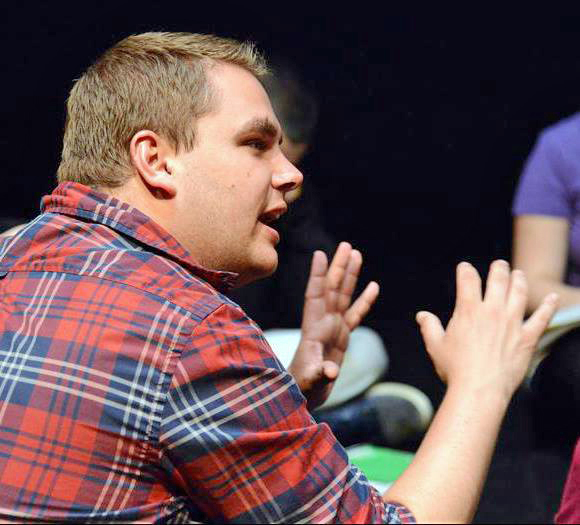Slipstream Theatre Initiative spurs discussion with 'St. Sebastian' beginning June 16
As more and more young people from Detroit's suburbs find jobs in the city and settle into some of its historic black neighborhoods, longtime residents have expressed concern over what impact such changes will have on their communities. Beginning June 16, Ferndale's Slipstream Theatre Initiative tackles the hot-button topic of gentrification, but with a twist perfectly suited to stimulate discussion during Pride Month.
"'St. Sebastian' is about a gay couple, a gay white couple, that find a very affordable repo house in a historically black neighborhood," New York City and Indianapolis-based playwright Andrew Kramer recently told BTL. "One partner thinks it's a good opportunity for them to make some money by flipping it and reselling it at a higher cost; the other partner slowly but surely starts to take pretty big issue with this. And that only becomes further complicated when they meet one of their neighbors, who is a young, black boy."
It's a subject with which the author is intimately familiar, as it's one he himself experienced.
"I actually was flipping a house with my partner," Kramer explained. "(He) decided that he was going to get this really cheap repo house in an African-American neighborhood, and I just was sort of along for the ride."
The journey, however, was fraught with much soul-searching.
"It was his first flip, and neither of us knew what we were really doing, literally, in sort of like a logistic sense," Kramer said. "As we started to settle in, much like the couple in the play, I was like, 'Wait a minute, I think this is a lot more complicated than we originally thought.' And that's not about putting up walls and picking paint colors; that's literally about our presence in the neighborhood – and what we were doing to the neighborhood economics and all sorts of other really tough questions and complicated thoughts."
The two were the only whites in what Kramer calls "a little pocket neighborhood" just north of Downtown Indianapolis, anchored by "a beautiful African-American church on the corner" and a half-dozen or so streets that surrounded their house. "It was an interesting experience. One of the characters in the play says, 'We're not contributing to a problem, we're starting one.' I thought about that a lot."
Kramer was especially concerned about how he and his partner would be received by their neighbors, given the ever-increasing racial tensions in the country.
"Tamir Rice had just been killed in Cleveland, and I'm from Cleveland. So that was really hard; it was on my mind a lot," he said. "And there's the question of responsibility that I kept thinking about as a greater citizen of the world. And so I, of course, did a whole bunch of spiral thinking, like, 'They don't want us here.' And it wasn't that I was mad about that or angry about that, it was like I understood it in a way that I had never really considered before."
In hindsight, such thinking built a war between them and their neighbors that might not have been necessary.
"I'm certain they probably would have come over and said hello to us and been lovely, but because of my nervousness, and sort of unwillingness to stoke any kind of potential fires that would have been there, and because of the larger political scope of the world, we really did keep to ourselves," Kramer said. "We did not meet them, and it was a pretty solitary confinement. I think that that's interesting, given that it was on us coming into their neighborhood, and we chose to remain sort of solitary."
It was a decision Kramer thought about throughout his time in the house – and it's one he examines throughout his play.
"One side says yes, we should, as a member of this community, be doing our due diligence to meet people and say hello and introduce ourselves, and create and contribute to this sort of like lovely neighborhood that we've moved into," he said. "That's Monday morning. And then on Tuesday morning I would wake up and think, 'But no, maybe we shouldn't be here at all, because it's not that we should go and say hi, and it's not that we should go and be neighborly. It's like, what if they don't want that?'"

Playwright Andrew Kramer.
But it was more than that: The two were there simply as temporary custodians of the property. "We didn't plan to live here. We planned to literally make this house – quote-unquote – better. Which means a higher price, which means pricing people out, which means changing the neighborhood, which means – you know, all of that stuff. So it was a lot of Monday morning thinking turning into Tuesday morning thinking that was exactly opposite of the twenty-four hours before it."
From opening the door for the first time to selling it, Kramer and his partner lived in the house for about two years. "It was a changing point in both our lives," Kramer said. "And I got a play out of it."
That play is exactly what Slipstream's artistic director was searching for when planning his company's June schedule.
"We were looking for something in the Pride slot that didn't fall under the glittery, gay men (category) that we've done for the last three seasons," said Bailey Boudreau, who is also directing the play. "We wanted something that expressed pride in a different kind of way, and outside of just gay men – addressed color, and not just homosexuality, but race, and pride, and community, and pride in Detroit. And pride in, you know, who we are as people."
In addition, Boudreau was looking for something that his young artists could sink their teen into. "They're a lot less stuck in one realm," he said. "They're a lot less gay man or lesbian, or black or white, or this or that. They're much freer. So we wanted to try to encompass that in our Pride month."
It was a chance encounter that brought Boudreau and Kramer together: a staged reading of Slipstream's production of Maxim Vinogradov's award-winning "A Night of Stars with Tennessee Williams" at The American College Theater Festival held at the University of Indianapolis this past January.
"So he sent us a couple of plays, and this one struck me because I thought the characters were really, really well-developed," Boudreau said. "And I was really excited by a playwright who could give me something that was no set, and you don't need lights, you don't need any of the stage magic. You just need really good actors to tell the story."
And that he has. The Michigan premiere of "St. Sebastian" will star local favorite Richard Payton, who Boudreau immediately knew would be perfect for the show.
"So it was just casting around Richard, which was pretty easy because he's incredibly great to work with, but he's also incredibly gracious and I knew that if he could work with some younger actors, it would be a really beneficial experience for them," he said. "And so it worked out that way."
After minor accommodations were made by the playwright to adjust the characters' ages, the director had his ideal cast. Payton's partner will be played by rising star Jackson Abohasira, who "holds his own," Boudreau said. David Wilson will complete the cast as the young neighbor.
For Kramer, his expectations are that his play will stimulate a much-needed conversation – and it may not be a comfortable one for many people, especially white liberals.
"As we progress and as we become more linguistically savvy about the words that we use to call things, I think that we have to have a discussion about queerness, especially white queerness," he said. "About what white queer people, especially white gay men, think that they're allowed to do and say. And so it gets really complicated when you have queerness butting its head against race. And what then – and this is totally what the play is about – how do we even begin to literally talk about it? What are the literal words and the literal language to sit down with someone and say, 'This is who you are, and I understand it in my own way. This is who I am, I think you understand it in your own way. How can we talk about this?''
"Because I don't think we know how to yet. And I hope that we will learn soon."
"St. Sebastian" will be at the Slipstream Theatre Initiative located at 460 Hilton Road, Ferndale. More information can be found by calling 313-986-9156 or going online to slipstreamTI.com. Tickets cost $12 and showtimes will be at: 8 p.m. Friday, June 16, 22, 29, July 6; 8 p.m. Saturday, June 16, 23, 30, July 7; and 7 p.m. Sunday, June 17, 24, July 1, 8.










